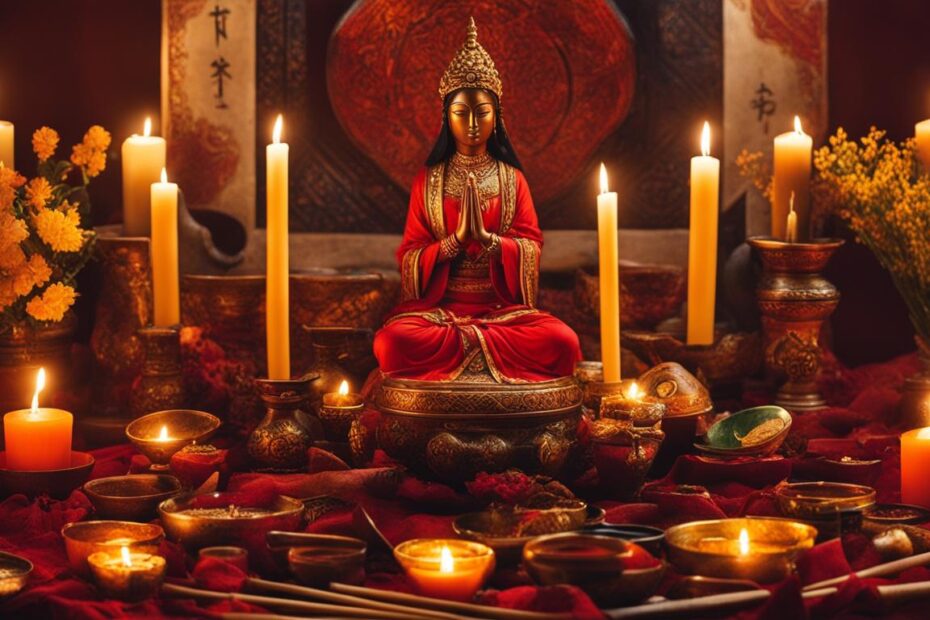Prayer and rituals have a deep-rooted significance in various belief systems and religious traditions. They play a vital role in shaping our everyday lives and connecting us with the divine. Through the exploration of different cultural and spiritual practices, we can gain a deeper understanding of their origins, significance, and how they contribute to our personal and collective spiritual growth.
Key Takeaways:
- Prayer and rituals are integral to different belief systems and religious traditions.
- Exploring cultural and spiritual practices deepens our understanding of their origins and significance.
- Prayer and rituals contribute to personal and collective spiritual growth.
- These sacred practices connect us with the divine and shape our everyday lives.
- The exploration of prayer and rituals fosters unity and enhances our spiritual journey.
Native American Spirituality: Honoring the Land and Mother Earth
Native American spirituality encompasses diverse beliefs and practices that revolve around the profound reverence for the land and Mother Earth. It emphasizes the importance of honoring and respecting nature as a sacred entity. One of the rituals that has been adopted from Native American culture is the burning of white sage, which is believed to cleanse spaces of negative energy. It is crucial to approach these practices with cultural appreciation and respect to avoid cultural appropriation.
The act of burning sage, known as smudging, has been used for centuries by Native American tribes as a means of spiritual purification. Sage is believed to have cleansing properties that can rid an area or person of negative energy, promoting balance and harmony. However, it is essential to understand that smudging is not a casual trend or a form of decoration but a deeply sacred practice.
Cultural appreciation involves understanding the historical context and significance of rituals like burning sage. It requires respecting and honoring the traditions and beliefs of Native American communities. Before engaging in smudging or other sacred practices, it is essential to educate ourselves, seek guidance from Native American elders or spiritual leaders, and approach these practices with reverence and sincerity.
To embrace cultural appreciation, we can educate ourselves about the diverse Native American cultures and their spiritual customs. By doing so, we can gain a deeper appreciation for the interconnectedness between humans and the natural world, fostering a sense of unity and respect for all living beings.
Native American Spirituality Quotes
“The land is our mother. We are connected to the land, and it is our duty to protect and honor it.” – Chief Joseph, Nez Perce Tribe
“Burning sage is not a trend or a fashion statement. It is a sacred ritual deeply rooted in our culture and traditions.” – Maria Yellow Horse Brave Heart, Oglala Lakota Tribe
Native American Spirituality Practices
| Sacred Practice | Description |
|---|---|
| Burning Sage | A ritual of burning white sage to cleanse spaces of negative energy and promote spiritual purification. |
| Vision Quest | A solitary journey into nature to seek spiritual guidance and connection with the divine. |
| Sweat Lodge Ceremony | A purification ritual involving a small enclosed hut, steam, and prayer to cleanse the mind, body, and spirit. |
| Medicine Wheel | A symbolic representation of the interconnectedness of all living beings and the cycles of life. |
Wicca, Druidism, and Earth-Based Religions: Connecting with Nature and Self-Empowerment
Wicca, Druidism, and other earth-based religions offer individuals a unique opportunity to connect with nature and tap into their own self-empowerment. These spiritual traditions embrace rituals that align with the cycles of the natural world and emphasize the healing power of plants. By exploring these practices, individuals can explore the concept of magic and their own ability to shape their destinies.
Wicca, a modern pagan witchcraft tradition, places great importance on the worship of deities associated with nature. Wiccans believe in harnessing the energy of the natural world to manifest their desires. Through rituals and ceremonies, Wiccans celebrate the changing seasons, such as the equinoxes and solstices, and honor the balance between light and dark.
Druidism, on the other hand, draws inspiration from the ancient Celtic culture. Druids revere nature and view it as a source of wisdom and spiritual connection. They perform ceremonies in sacred groves, where they seek guidance from the land, trees, and elements. By attuning themselves to nature, Druids gain insight and develop a deeper understanding of their place in the world.
“The natural world has so much to teach us if we are willing to listen. By cultivating a deep connection with nature, we can rediscover our own innate power and the magic that resides within us.” – Anonymous
In addition to nature-based rituals, earth-based religions often emphasize the use of herbs and plant-based remedies for healing and transformation. Practices such as herbology and the creation of personal apothecaries allow individuals to harness the medicinal and magical properties of plants. These traditions recognize the interconnectedness between humans and the natural world, and by working with nature, individuals can experience a profound sense of harmony and self-empowerment.
| Wicca | Druidism |
|---|---|
| Modern pagan witchcraft tradition | Draws inspiration from ancient Celtic culture |
| Emphasizes worship of deities associated with nature | Reveres nature and seeks guidance from the land |
| Celebrates the changing seasons and balance of light and dark | Performs ceremonies in sacred groves |
| Focuses on harnessing the energy of the natural world | Seeks wisdom and spiritual connection from nature |
| Utilizes herbology and plant-based remedies | Recognizes the interconnectedness between humans and nature |
Exploring Wicca, Druidism, and other earth-based religions provides individuals with a pathway to reconnect with nature, tap into their own inner power, and deepen their spiritual journey. By embracing these traditions, individuals can develop a greater appreciation for the natural world and cultivate a sense of balance and harmony within themselves.

Hinduism: Water Pouring Rituals and Divine Connection
In Hinduism, water pouring rituals hold significant spiritual meaning. Water is believed to symbolize purity and life, making these rituals a powerful tool for spiritual purification and connection with the divine. Pouring water over deities or sacred objects represents the removal of impurities and the renewal of the self. It is a way for devotees to express their gratitude, seek blessings, and establish a deeper connection with the divine.
Hinduism encompasses a wide range of rituals, each with its own purpose and symbolism. One such ritual is the Abhishekam, where devotees pour water over a deity or an idol. This act is accompanied by the chanting of prayers and mantras, creating a sacred and meditative atmosphere. The pouring of water is done with love and devotion, symbolizing the offering of oneself to the divine.
Water pouring rituals also play a significant role in specific Hindu festivals, such as the Kumbh Mela and the Shivaratri. During the Kumbh Mela, millions of pilgrims gather to take a holy dip in the sacred rivers, believing that the water will cleanse them of their sins and provide spiritual purification. Similarly, on Shivaratri, devotees pour water on Shiva Lingam, representing Lord Shiva, to seek his blessings and connect with his divine energy.
Hinduism Water Pouring Rituals: Key Insights
- The water pouring rituals in Hinduism have deep spiritual significance, symbolizing purification and connection with the divine.
- These rituals are performed with love and devotion, expressing gratitude and seeking blessings from the deities.
- Water pouring rituals are an integral part of Hindu festivals like the Kumbh Mela and Shivaratri, where millions of devotees gather to seek spiritual purification and connection with the divine.
| Ritual | Purpose | Symbolism |
|---|---|---|
| Abhishekam | Spiritual purification and connection with the divine | Offering oneself to the divine through the pouring of water |
| Kumbh Mela | Cleansing of sins and spiritual purification | Belief in the sacredness and purifying power of the holy rivers |
| Shivaratri | Seeking blessings and connecting with Lord Shiva | Pouring water on the Shiva Lingam as a symbol of devotion |
Conclusion
Prayer and rituals have long been revered as sacred practices in diverse religious traditions and spiritual customs. They hold immense significance in our lives, serving as a means of connecting with the divine, seeking spiritual purification, and expressing gratitude.
By embracing the richness and diversity of these traditions, we can deepen our understanding of different cultures and foster unity. Exploring the various prayer and ritual practices allows us to find common ground and celebrate the universal human quest for meaning and truth.
Regardless of our individual beliefs, prayer and rituals have the power to enhance our spiritual growth. They offer a path to personal introspection, self-discovery, and a deeper connection with the divine. Through these sacred practices, we can tap into a profound sense of purpose and find solace in the rhythms of life.
As we continue our journey of exploration, may we carry with us the reverence for prayer and rituals, valuing and respecting the traditions that have shaped humanity throughout history. Let us embrace the wisdom and beauty found in religious traditions and spiritual customs, and may they continue to inspire and guide us on our individual and collective paths.
FAQ
What is the significance of prayer and rituals in different religious traditions?
Prayer and rituals have a deep-rooted significance in various belief systems and religious traditions. They play a vital role in shaping our everyday lives and connecting us with the divine.
How does Native American spirituality honor the land and Mother Earth?
Native American spirituality encompasses diverse beliefs and practices that revolve around profound reverence for the land and Mother Earth. It emphasizes the importance of honoring and respecting nature as a sacred entity.
What is the burning of white sage in Native American culture?
The burning of white sage is a ritual adopted from Native American culture. It is believed to cleanse spaces of negative energy. It is crucial to approach these practices with cultural appreciation and respect to avoid cultural appropriation.
How do earth-based religions like Wicca and Druidism connect with nature and self-empowerment?
Earth-based religions like Wicca and Druidism emphasize the connection with nature and self-empowerment. These traditions focus on rituals that align with the cycles of the natural world, celebrate equinoxes and solstices, and highlight the healing power of plants.
What is the spiritual meaning of water pouring rituals in Hinduism?
Water pouring rituals hold significant spiritual meaning in Hinduism. Water symbolizes purity and life, making these rituals a powerful tool for spiritual purification and connection with the divine. They are a way to express gratitude, seek blessings, and establish a deeper connection with the divine.
What is the purpose of prayer and rituals in various traditions?
Prayer and rituals are an integral part of various traditions and belief systems. They serve as a means of connecting with the divine, seeking spiritual purification, and expressing gratitude. Embracing the diversity of prayer and rituals allows us to find common ground and celebrate the universal human quest for meaning and truth.









